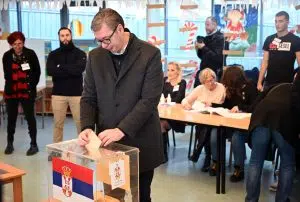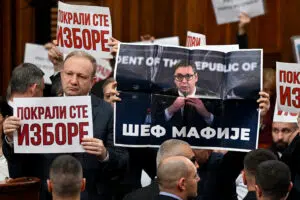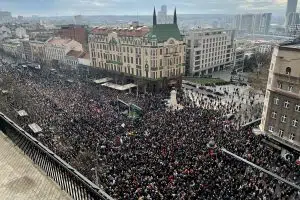Brussels – The European Parliament’s denunciation of what took place in Serbia on Dec. 17 could not have been harsher considering the support in the Strasbourg Chamber. With 461 in favor, 53 against (all of the ID group apart from the Italians of the Lega, who abstained), and 43 abstentions (including all MEPs from Fratelli d’Italia, unlike the majority of the ECR group in favor), the plenary session of the European Parliament gave the green light today (Feb. 8) to the joint resolution on the situation in Serbia after the December elections, raising not only concerns about the rule of law in the EU candidate country but also calling for heavy-handed action by the Commission should the involvement of the authorities and the outgoing government in electoral fraud be established.

A resolution that all political groups in the European Parliament (the six motions of resolutions signed by the EPP, S&D, Renew Europe, Greens/Ale, ECR, and the Left merged into a single text) fully shared, except for the far-right Identity and Democracy, which as in the January plenary debate, was against denouncing voting irregularities and continued with distorted rhetoric of EU-Serbian (and Russian) relations. It is the numbers in the European Parliament that make it clear that it is time for EU institutions to get serious about Belgrade urging “the Commission to launch an initiative to send an expert mission to Serbia to assess the situation as regards the recent elections and post-election developments,” to facilitate social dialogue and to ” assess and address the systemic rule of law issues in Serbia, looking at the example of the ‘Priebe Reports’[recommendations of an expert group commissioned by the Commission in 2015 on North Macedonia, ed.].” In particular, the MEPs recall the fact that the December snap Parliamentary elections “deviated from international standards,” both due to the interference of the President of the Republic, Aleksandar Vučić, in support of his Serbian Progressive Party (SNS), and the “systematic fraud that compromised the integrity” of the election round. For this reason, the EU mission should be accompanied by an “independent international investigation” into the “irregularities in the parliamentary, provincial, and municipal elections,” focusing on those for the Belgrade Assembly.
Despite repeated appeals from the international community, no “institutional response to the serious allegations of the incumbents’ involvement in electoral manipulation and abuse, which contributes to an atmosphere of impunity and ensures the continuation of these practices,” and – MEPs warn – “if allowed to persist without any repercussions, this practice will continue to undermine trust in Serbia’s electoral process and institutions, irrevocably hindering democratic rule and further European integration.” In the face of an alarming picture in terms of deteriorating standards of respect for the rule of law for a country that has been a candidate for EU membership for 12 years, the EU Parliament also accuses the EU executive of the “lack of explicit criticism”, particularly from the most controversial member of the Board of Commissioners, Hungary’s Olivér Várhelyi responsible for Enlargement.

Opposition posters at the first session of the National Assembly of Serbia on February 6, 2024 against the president of the republic, Aleksandar Vučić, who was called the ‘head mafia’ (credits: Andrej Isakovic / Afp)
The Commission is called upon to take the harshest action if Belgrade fails to implement the election recommendations “or if the findings of this investigation indicate that the Serbian authorities were directly involved in the voter fraud.” This means a “suspension of EU funding on the basis of serious breaches of the rule of law” and, as a result, a possible halt to accession negotiations, which “should advance only if the country makes significant progress on its EU-related reforms,” the resolution reads. Not to mention the Serbian president’s accusations against EU member states and European media that “they were involved in organizing the post-election protests.” In this regard, all EU institutions agree in their denunciation of Vučić’s allusions to “a special war” being waged by the Western press: “If he looks at what is being done with the support of his administration about the quality of journalism,” in Belgrade he allows “the instrument of Russian propaganda and lies to set foot on Serbian soil,” European External Action Service (EEAS) spokesman Peter Stano said in a press point. The reference is to Russia Today Balkan (from July 2022 operational in Serbia), “a broadcaster banned by the European Union for its subversive activities in connection with the illegal war against Ukraine.”
Tensions in Serbia after early elections
Despite high expectations on the eve of the elections from the ‘Serbia Against Violence’ coalition, the Serbian Progressive Party won again in snap elections with 46.67 percent of the vote, trailing by 23 percentage points the very united opposition that came in second place. In the face of fraud and numerous illegal actions at the ballot box, thousands of people took to the streets responding to the call of the parties and movements that translated into political (pro-European) demands the street protests against the climate that led to the May Shootout. The Organization for Security and Cooperation in Europe (OSCE)-led election observation mission – in which members of the European Parliament also participated – also noted “the misuse of public resources, the lack of separation between official functions and campaign activities, and intimidation and pressure on voters, including cases of vote-buying.” Nearly a month after the early elections, protests against fraud by the ruling party continue, particularly in Belgrade.

In the capital, the situation remains tense. The possibility of a repeat of local elections, in which the Serbian Progressive Party claimed victory, cannot be ruled out: the party led in Belgrade by the pro-Russian Aleksandar Šapić won 49 seats (out of 110), which, however, would not be enough to control the City Assembly with the support of the far-right Russophile nationalist party ‘We, the Voice of the People’ of Branimir Nestorović alone. The coalition ‘Serbia Against Violence’ denounced that over 40 thousand people who arrived from Republika Srpska (the Serb-majority entity of Bosnia and Herzegovina) voted in Belgrade without being formally registered as residents and demanded the annulment of the ballot result, explicitly speaking of “electoral theft.” The same complaint came from MEP and member of the parliamentary delegation Viola von Cramon-Taubadel (Greens/Ale): “We have seen cases of organized transportation of voters from Republika Srpska and voter intimidation.”
Added to this is the case that Brussels “is following closely” (words of the EU Commission’s spokeswoman for Neighborhood Policy and Enlargement, Ana Pisonero) the violence suffered by the leader of the opposition Republican Party, Nikola Sandulović, who was picked up by Serbian intelligence services on Jan. 3 and severely beaten in detention for paying homage at the grave of Adem Jashari, one of the founders of the Kosovo Liberation Army (UCK). Members of the Serbian Security Information Agency (BIA) allegedly abducted and tortured Sandulović, then detained him in Belgrade’s central prison without access to independent medical care. Among those responsible for the violence are allegedly Milan Radoičić, deputy head of Lista Srpska (the main party representing the Serb minority in Kosovo and closely controlled by President Vučić), who, among other things, already admitted to organizing the armed attack in northern Kosovo in late September last year. The former head of Serbian intelligence (who resigned two months ago), Aleksandar Vulin, reportedly personally ordered Sandulović’s arrest, but the defense lawyer pointed the finger at President Vučić.
Find more insights on the Balkan region in the newsletter BarBalcani hosted by Eunews
English version by the Translation Service of Withub







